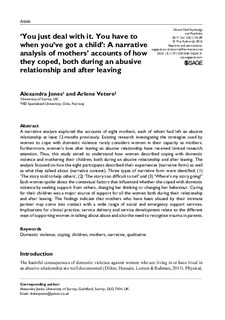'You just deal with it. You have to when you’ve got a child’: A narrative analysis of mothers’ accounts of how they coped, both during an abusive relationship and after leaving
Journal article, Peer reviewed
Permanent lenke
http://hdl.handle.net/11250/2431051Utgivelsesdato
2017Metadata
Vis full innførselSamlinger
- Artikler / Articles [1185]
Originalversjon
10.1177/1359104515624131Sammendrag
A narrative analysis explored the accounts of eight mothers, each of whom had left an abusive relationship at least 12months previously. Existing research investigating the strategies used by women to cope with domestic violence rarely considers women in their capacity as mothers. Furthermore, women’s lives after leaving an abusive relationship have received limited research attention. Thus, this study aimed to understand how women described coping with domestic violence and mothering their children, both during an abusive relationship and after leaving. The analysis focused on how the eight participants described their experiences (narrative form) as well as what they talked about (narrative content). Three types of narrative form were identified: (1) ‘The story told to help others’, (2) ‘The story too difficult to tell’ and (3) ‘Where’s my story going?’ Each woman spoke about the contextual factors that influenced whether she coped with domestic violence by seeking support from others, changing her thinking or changing her behaviour. Caring for their children was a major source of support for all the women both during their relationship and after leaving. The findings indicate that mothers who have been abused by their intimate partner may come into contact with a wide range of social and emergency support services. Implications for clinical practice, service delivery and service development relate to the different ways of supporting women in talking about abuse and also the need to recognise trauma in parents.
